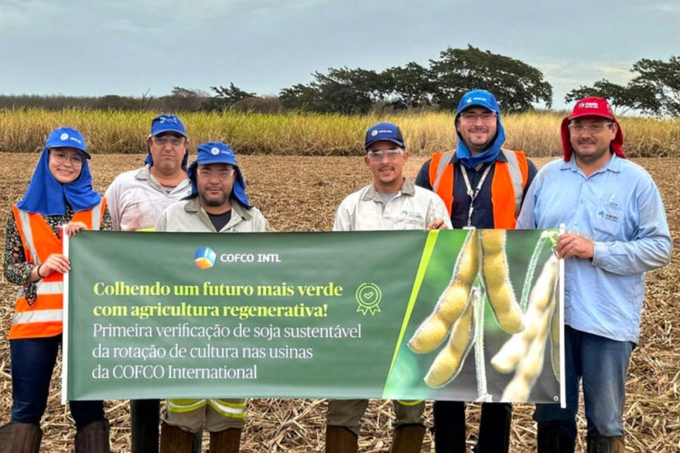May 24, 2025 | 16:23 GMT +7
May 24, 2025 | 16:23 GMT +7
Hotline: 0913.378.918
May 24, 2025 | 16:23 GMT +7
Hotline: 0913.378.918

The soybeans were produced as a rotational crop at COFCO International’s sugar plantations in São Paulo, Brazil.
The transaction builds on the first-ever agreement, shipped by COFCO in May, as part of the Green Value Chain Task Force initiated by the World Economic Forum’s Tropical Forest Alliance.
The soybeans were produced as a rotational crop at COFCO International’s sugar plantations in São Paulo, Brazil. Crop rotation is a regenerative agriculture practice that improves soil health, boosts yields, and reduces emissions by minimizing use of synthetic fertilizers.
Brazil is the world’s biggest soy producer, but the increased production is associated with deforestation and conversion of natural ecosystems, COFCO said. As a major exporter of Brazilian soy, COFCO International is taking steps to improve traceability, risk management and supplier performance.
In addition to being deforestation- and conversion-free with a Dec. 31, 2020, cut-off date, the soybeans passed third-party audits certifying they were produced in compliance with the COFCO International Responsible Agriculture Standard, which requires use of sustainable farming practices including water management, biodiversity conservation, and ethical labor standards.
The transaction follows a mass balance trade system. COFCO International also has completed pilot shipments of soy products from Brazil and Argentina in preparation for compliance with the European Union Deforestation Regulation (EUDR), which requires a segregated trade system.
COFCO International said it isdedicated to eliminating deforestationfrom its global soy, corn and palm supply chains by 2025.
(WG)

(VAN) The People's Committee of Tra Vinh province has approved an adjustment to the investment policy for the Green Hydrogen Plant project, increasing its area to approximately 52.76 hectares.
![Reducing emissions from rice fields: [2] Farmers’ commitment to the soil](https://t.ex-cdn.com/nongnghiepmoitruong.vn/608w/files/news/2025/05/05/dsc08881jpg-nongnghiep-140632.jpg)
(VAN) Clean rice cultivation model in Thuong Tan commune, Bac Tan Uyen district, is assisting local residents in achieving sustainable agriculture by substantially reducing costs, increasing productivity, and protecting the environment.

(VAN) At the conference to disseminate Resolution No. 68, AgriS introduced its digital agricultural ecosystem and reaffirmed its commitment to accompanying the Government in promoting private sector development and sustainable agriculture.

(VAN) 'Blue Ocean - Blue Foods' initiative is designed to restore marine ecosystems and establish sustainable livelihoods for local communities by cultivating a minimum of 1,000 hectares of cottonii seaweed in the first three years.
/2025/05/21/4642-3-112707_603.jpg)
(VAN) The V-SCOPE project has made direct contributions to three out of six pillars of the Comprehensive Strategic Partnership between Vietnam and Australia.

(VAN) Facing the threat of rabies spreading to the community, Gia Lai province urgently carries out measures to vaccinate dogs and cats on a large scale.

(VAN) Disease-free livestock farming not only protects livestock herds but also stabilizes production and livelihoods for many farmers in Tuyen Quang.